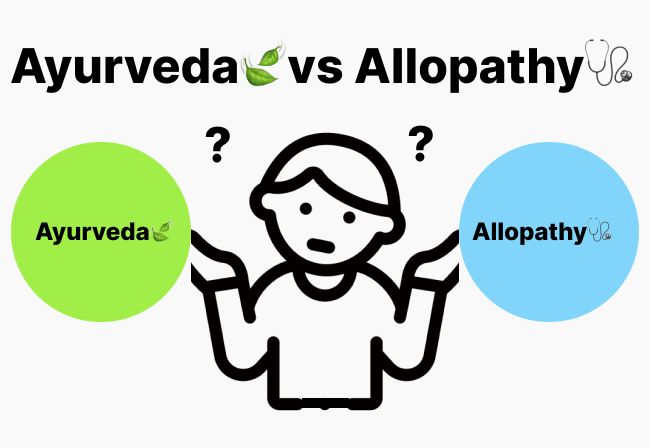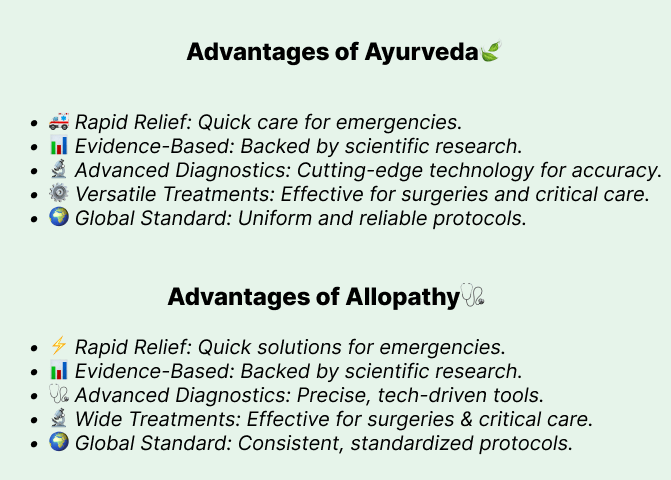
The debate between Ayurveda and Allopathy has been ongoing for years. As antibiotic resistance rises and traditional practices decline, the question arises: How can we integrate these two systems to create a perfect synergy? This article delves into the differences, advantages, and potential for integration between Ayurveda and Allopathy.
In This Article
ToggleIntroduction
Ayurveda, a traditional Indian medical system, emphasizes a holistic approach to health, focusing on treating the entire person rather than isolated symptoms. On the other hand, Allopathy, a modern, evidence-based medical system, treats diseases using synthetic drugs and advanced surgical techniques. Integrating Ayurveda and Allopathy is a holistic approach to health that combines the best of traditional medicine and modern science.
Quick Tip: 🤝 Balance is key! Combining ancient wisdom and modern science can create a holistic approach to healthcare.
Understanding Ayurveda and Allopathy

Ayurveda focuses on natural remedies and holistic healing for a balanced lifestyle.
Ayurveda
- Philosophy: Treats the individual as a whole, considering mind, body, and spirit.
- Approach: Focuses on lifestyle, diet, natural remedies, and exercises.
- Treatment: Uses herbal medicines and natural therapies with minimal side effects.
- Learning: Traditionally, practitioners invest their entire lives in mastering Ayurveda through hands-on experience and deep understanding.
Quick Tip:🍃 Go natural! Ayurveda’s focus on diet, exercise, and herbal remedies can enhance overall well-being.
Allopathy

- Philosophy: Relies on evidence-based medicine and scientific research.
- Approach: Focuses on treating symptoms and diseases with synthetic drugs or surgeries.
- Treatment: Provides faster relief and addresses acute conditions effectively.
- Technology: Leverages advanced diagnostic tools and robotics for precision.
Quick Tip: 🩺 Science saves lives! For acute or critical conditions, trust evidence-backed allopathic treatments.
Comparison of Ayurveda and Allopathy
| Aspect | Ayurveda | Allopathy |
|---|---|---|
| Philosophy | Holistic approach to health and wellness | Evidence-based treatment of diseases |
| Medicines | Herbal and natural remedies | Synthetic and chemical-based drugs |
| Side Effects | Minimal side effects | Potential for side effects, well-documented |
| Approach to Treatment | Treats root causes | Treats symptoms |
| Effectiveness | Suitable for chronic and lifestyle disorders | Effective for acute and life-threatening diseases |
| Research and Evidence | Limited formal studies on safety and efficacy | Extensive research and clinical trials |
| Cost | Generally more affordable | Can be expensive, especially with advanced treatments |
Quick Tip: 📝 Know your options! Choose Ayurveda for chronic care and Allopathy for acute conditions for optimal results.
Strengths of Ayurveda and Allopathy

Advantages of Ayurveda
- Effective in managing lifestyle disorders like diabetes, hypertension, and insomnia.
- Natural remedies align with traditional diets and lifestyles.
- Minimal side effects due to the use of herbal ingredients.
Advantages of Allopathy
- Provides rapid relief for acute and emergency conditions.
- Backed by rigorous research and scientific validation.
- Equipped with advanced technology for precise diagnosis and treatment.
Quick Tip: ⚖️ Strength in diversity! Ayurveda offers long-term healing, while Allopathy ensures quick relief in emergencies.
Challenges and Opportunities for Integration
- Antibiotic Resistance: Allopathy faces increasing challenges due to antibiotic resistance. Ayurveda, with its natural remedies, can offer alternative solutions for certain conditions.
- Decline in Traditional Practices: While Ayurveda is gaining popularity globally, its practice in Eastern countries like India is declining due to a lack of institutional support.
- AI and Robotics in Medicine: The rise of AI in Allopathy might replace certain diagnostic roles, but it cannot replicate the intuition and holistic understanding of Ayurveda.
Quick Tip: 🌍 Why not both? Integrating Ayurveda and Allopathy can overcome challenges like antibiotic resistance.
A Path Forward: Integration of Ayurveda and Allopathy

- Use Ayurveda for chronic and lifestyle-related conditions.
- Leverage Allopathy for acute and emergency care.
- Encourage cross-disciplinary learning among practitioners.
- Promote evidence-based research in Ayurveda to validate its effectiveness.
Conclusion
No single medical system is perfect. Ayurveda and Allopathy have their own strengths and limitations. Integrating Ayurveda and Allopathy allows individuals to benefit from both ancient healing methods and contemporary treatments. By carefully integrating Ayurveda and Allopathy, patients can experience a more well-rounded approach to health and wellness.
Quick Tip: 🌟 Holistic healthcare = Harmony! Combining traditional and modern medicine leads to better health outcomes.
The insights shared in this article are based on research and my personal understanding. While I strive for accuracy, there may be variations in interpretation or scientific nuances I might have missed. If you find any information irrelevant or incorrect, please feel free to reach out or share your thoughts—I’m open to learning and improving.
Frequently Asked Questions (FAQs)
1. What is Ayurveda?
Ayurveda is a traditional Indian medical system that focuses on holistic health. It uses natural remedies, diet, and exercises to treat the root causes of health issues.
2. What is Allopathy?
Allopathy is a modern medical system that relies on evidence-based practices, synthetic drugs, and advanced technologies to treat diseases and symptoms.
3. How are Ayurveda and Allopathy different?
Ayurveda: Emphasizes treating the whole person, focusing on lifestyle, diet, and natural remedies with minimal side effects.
Allopathy: Focuses on treating diseases quickly and effectively using synthetic drugs and advanced technology but may have more side effects.
4. Can Ayurveda and Allopathy be combined?
Yes! Integrating Ayurveda and Allopathy can create a holistic approach to healthcare. Ayurveda is effective for chronic conditions, while Allopathy excels in acute and emergency care.
5. Are Ayurvedic treatments scientifically proven?
While Ayurveda has been practiced for centuries, formal scientific research on its treatments is still growing. Evidence-based studies are needed to validate its efficacy further.
6. Which is better: Ayurveda or Allopathy?
Neither system is universally better. Ayurveda is ideal for chronic conditions and overall well-being, while Allopathy is better for acute and critical situations. A combination of both can provide optimal healthcare.
7. Is Ayurveda safe for everyone?
Ayurveda is generally safe, but treatments should be customized to the individual. Consult a qualified Ayurvedic practitioner to ensure the remedies suit your health needs.
8. Why is integration between Ayurveda and Allopathy important?
Integration helps address modern challenges like antibiotic resistance while leveraging the strengths of both systems for comprehensive healthcare solutions.

